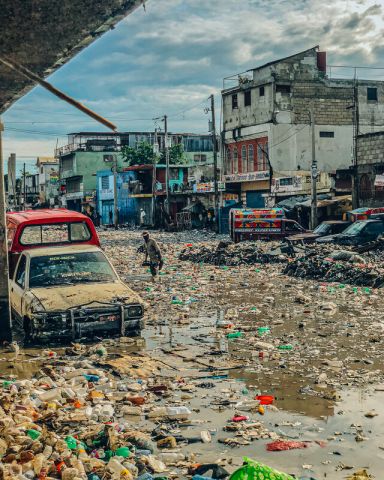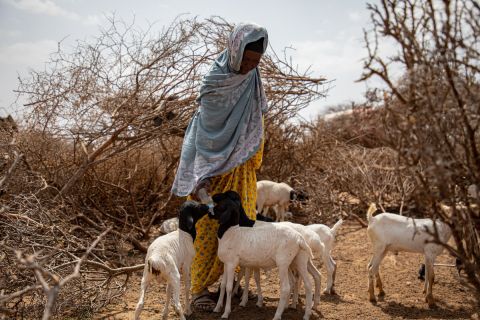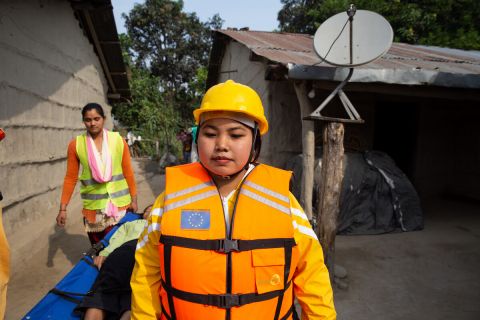A new ActionAid UK briefing, released ahead of COP28, is urging the international community to prioritise loss and damage funding for locally-led women’s groups and provide flexible funds for countries facing climate-driven humanitarian crises.
Analysis from ActionAid UK’s new briefing paper, Escalating Climate Emergencies: Implications for Humanitarian and Loss & Damage Policy and Programming, supported by players of People’s Postcode Lottery, draws upon the lived experiences of three women facing the climate disaster across three continents: Alta Prophète in Haiti, Toe Toe in Myanmar, and Khadija Jamal in Somaliland.
With the world’s major polluters announcing pledges to the loss and damage fund agreed last year at COP, the three women are calling on global leaders at COP to prioritise funding for youth-led and women-led organisations.
Alta Prophète, founder and coordinator of the Organisation of Women Peasants of Ouanaminthe, Haiti, described how her grassroots organisation is often better placed than national and international agencies to respond to local needs, especially those of women and girls. Yet, she stated: “It is difficult to work with the UN or donors, if not impossible, because they do not recognise that our role is fundamental.”
Alta elaborated that a lack of reliable long-term funding had left her organisation reliant on shorter term assistance that fails to build resilience: “There is little funding to help women farmers and girls to deal with climate change issues. We are not only waiting for funding, but we also want to be autonomous.”

Severe flooding in Haiti, 2023. Victoria Onelien/ActionAid
Despite there being a complex interplay between climate change, conflict, economic shocks and displacement in many of the countries at greatest risk of climate impacts, the funding requirements imposed by donors continue to push organisations into siloed ways of working with limited flexibility to adapt funding to needs. Toe Toe explained, “We used to have many development projects. After the coup, humanitarian aid support is the most needed in Myanmar. But we could not change our program. We don’t want that. We should be able to change the project target, based on the contextual change.”
Similarly, Khadija Jamal, Director of the Somaliland Women and Children Development Organisation, urged international humanitarian actors to “consult with people who have more knowledge on these issues,” adding that “my most sustainable projects have been long-term funds.”

Aisha Berkhad, 60-year-old migrant pastoralist living outside Ceel-Giniseed, Somaliland. Credit: Daniel Jukes/ActionAid
In each of these settings, the impacts of climate change are increasing in severity and frequency year on year, leaving a trail of destruction and weakening the ability of communities to respond and adapt in its wake. Over the past year, all three countries have suffered from major climate catastrophes: from the worst flooding in over a century in Somalia on top of successive droughts, a devastating cyclone in Myanmar, and major floods and landslides that flooded over 13,500 homes in Haiti. When disasters like this strike, women are a shocking 14 times more likely to die than men and often are at further risk of sexual violence, domestic violence, and child marriage as a changing climate impacts their and their families' livelihoods.
Despite this, and despite women in the briefing being at the forefront of community responses to the climate crisis, their voices are almost entirely ignored as part of loss and damage funding and programming.
ActionAid also works in Nepal which is among the top 10 countries most affected by climate disasters. Nepalese people are on the frontline of climate change and are facing substantial climate-induced loss and damage with flooding, landslides, drought and waterborne diseases now a frequent occurrence. Thanks to the support of players of People’s Postcode Lottery, ActionAid has supported flood-prone communities in Rajapur over the last decade to prepare for and build resilience against flooding and other unpredictable climatic events. The project, led entirely by women, has also helped farmers to prepare for and build resilience to flooding that has become deadlier and more frequent in that time. Across Rajapur, these women-led groups identify and map potential risks, provide information and training to community members on emergency responses, including how to make life jackets and run drills for flood, fire and earthquakes preparedness.

Antila, 24, Yuwa Bakheri, leads a group of community volunteers in Nepal. Credit: Uma Bista / ActionAid
The project, which has been scaled up across Nepal, is successfully protecting communities from flooding and saving lives, is a strong example of why approaches like these need loss and damage funding from the international community during COP.
Sita Chaudhary, Chair of The Community Disaster Management Committee in Rajapur, spoke about the vital importance of women-led responses to climate disasters.
“In the past, I didn’t know when there was a flooding risk. We only learned about a flood once it reached our neighbourhood or our homes... but after taking training, I have learned a lot more. [Today], we receive information by SMS, and the [local authority] also informs The Community Disaster Management Committee, and police, and we inform the community.
“Because of our experience in the past, today we can alert people who live in places that are at high flood risk before flooding happens. We now know which places are likely to be submerged in water.
“Now, when it rains for two to three days persistently, we know that floods will happen shortly afterwards, so we can inform and alert the community before they arrive.”
Zahra Hdidou, Senior Climate and Resilience Adviser at ActionAid UK, said that:
“Every day, women like Sita are keeping their communities safe from harm and showing incredible resilience in the face of an escalating climate crisis. But for many communities around the world, it is too late to adapt to climate change, leading to extreme losses and damages which require new and additional funding. For loss and damage funding to be truly transformative, global leaders need to look at the success of community-led responses like those in Rajapur and fund them at a much larger scale. In drastically scaling up loss and damage funding, many more communities would be better equipped to respond to the devastating impacts of the climate crisis in countries like Nepal.”
Drawing on the lived experiences of women ActionAid works with globally, this policy brief highlights four key recommendations for global leaders when pledging to loss and damage funds:
-
Loss and Damage finance needs to be new, additional and at scale and cannot be taken from existing climate, development or humanitarian funds;
-
Loss and Damage programming needs to be truly locally-led and enable local groups, particularly youth-led and women-led organisations, to have direct access to funding;
-
Responding to climate-induced loss and damage must integrate long-term resilience building and preparedness measures;
-
Loss and Damage finance must be flexible and adaptable, particularly in rapidly changing fragile and conflict-affected contexts.
[ENDS]
Contact the ActionAid press office on uk.media@actionaid.org or on 07753 973 486.
Zahra Hdidou is available for comment on request. Please contact the press office to arrange.
High resolution photos are available for each country context, which can be accessed here: https://stories.actionaid.org/?c=65201&k=c31ac75ec6